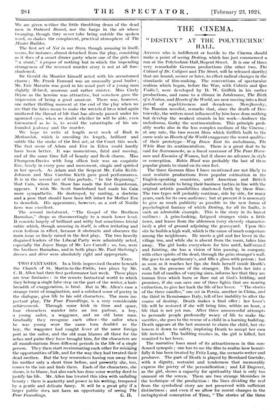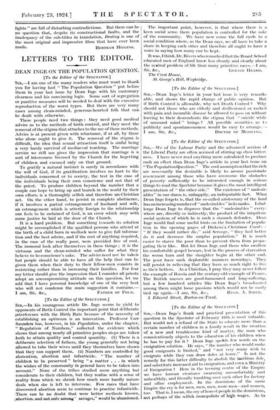THE CINEMA
•
"DESTINY" AT THE POLYTECHNIC HALL.
ANYONE who is indifferent or hostile to the Cinema should make a point of seeing Destiny, which has just commenced a run at the Polytechnic Hall, Regent Street. It is one of three very remarkable German productions (the other two, The Cabinet of Dr. Caligari and The Street, will be released shortly)
that are bound, sooner or later, to effect radical changes in the standards of film-making. The conventions of spectacular
realism which began, before the War, with Cabiria and Quo Vadis ?, were developed by D. W. Griffith in his earlier productions, and came to a climax in Intolerance, The Birth of a Nation, and Hearts of the World, are now moving into a final period of repetitiveness and decadence. Merejkovsky, the Russian novelist, remarks that, since the death of Dos- toievsky, the writers most influenced by him have done nothing but develop tire weakest strands in his work—Andreev the melodrama, Gorky the sentimentalism. This principle prob- ably works also in the less complex medium of the Cinema ; at any rate, the two recent films which Griffith built to the same scale as Hearts of the World exaggerate the worst qualities of their prototype—Way Down East its melodrama, The White Rose its sentimentalism. There is a great deal to be said for Scaramouche, as a lineal successor of The Four Horse- men and Enemies of Women, but it shows no advance.in style or conception. Robin Hood was probably the last of these popular giants to stand on its own feet.
The three German films I have mentioned are not likely to oust realistic productions from popular estimation in the English-speaking countries, until American and British producers decide to bring their business tactics in line with the original artistic possibilities shadowed forth by these films. The two types will probably continue, side by side, for many years, each for its own audience ; but at present it is necessary to give as much publicity as possible to the new forms of psychological fantasy of which Destiny, for all its faults, is such an admirable example. This is the story in its barest outlines : A grim-looking, fatigued stranger visits a little town, and leases from the aldermen (very cleverly character- ised) a plot of ground adjoining the graveyard. Upon this site he builds a high wall, which is the cause of much conjecture among the neighbours. He meets a girl and her lover in the village inn, and while she is absent from the room, takes him away. The girl looks everywhere for him until, half-crazed and fainting, she has a vision of him passing, in company with other spirits of the dead, through the grim stranger's wall. She goes to an apothecary's, and fills a glass with poison ; but as soon as it reaches her lips she finds herself inside Death's wall, in the presence of the stranger. He leads her into a room full of candles of varying sizes, informs her that they arc human lives which burn or flare out at God's bidding, and promises, if she can save one of three lights that are nearing extinction, to give her back the life of her lover. " The stories of the three candles," one set in Persia, another in China, and the third in Renaissance Italy, tell of her inability to alter the course of destiny. Death makes a final offer : her lover's life will be restored if she will bring him, within an hour, a life that is not yet run. After three unsuccessful attempts to persuade people professedly weary of life to make the sacrifice, she goes to the rescue of a child in a burning building. Death appears at the last moment to claim the child, but sire lowers it down to safety, imploring Death to accept her own life instead. The building crashes in, the girl is killed, but reunited to her lover.
The narrative loses most of its attractiveness in this con- densed synopsis ; one has to see the film to realize how beauti- fully it has been treated by Fritz Lang, the scenario-writer and producer. The part of Death is played by Bernhard Goetzke, with a dignity, restraint and tenderness that memorably express the poetry of the personification ; and Lil Dagover, as the girl, shows a capacity for spirituality that is only too unusual on the screen.- There are two 'strange blemishes in the technique of the prodUction : the lines dividing the real from the symbolical story are not preserved With sufficient distinctness ; and even if we allow for recent changes in the metaphysical conception of Time, " The stories of the three sights " are full of disturbing contradictions. But there can be no question that, despite its constructional faults, and the inadequacy of the sub-titles in translation, Destiny is one of the most original and impressive films that have ever been











































 Previous page
Previous page